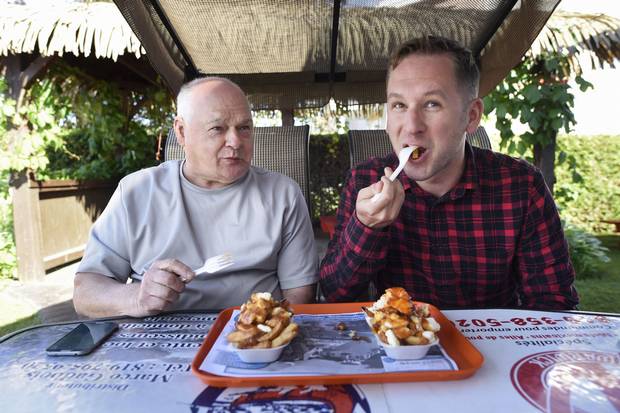I grew up in an ocean of French on the outskirts of Trois-Rivières. However, from an early age, I felt more at ease operating in English, and, though it was never my explicit intention, began focusing on, and absorbing, the culture of my Anglophone mother. It helped that her extended family was emotionally closer to us; I spent most summers in Nova Scotia with my maternal grandparents.
My father, Laurent Lamothe, is a 73-year-old French-Canadian I would describe as de souche, old stock. Like many in La Belle Province, he can trace his lineage back to before the arrival of soldiers carrying the British flag. He has broad shoulders from a lifetime of hard labour; and he has little formal education. He left the family farm for work Down East during the Quiet Revolution and came back a few years later with an English girl from the Maritimes on his arm. A federalist, he had no time for Quebec's last independence referendum – but he is a staunch Quebec nationalist nonetheless, proud of his province's culture and language.
As I got older, my dad could only watch in horror as I seemed to inch away from the French side of my family tree. Even my name shifted: The less French I felt, the more the Lamothe half fell out of usage. By my last year in elementary school I was firmly a Giovannetti, plain and simple. The choice would, understandably, remain a sore spot with my father for decades. After I moved to Montreal to study at Concordia, our communications pretty much consisted of a quick monthly phone call that ended with our joint lament for the Montreal Canadiens' weak defence.
Then, in 2013, as I was readying for a move to Toronto to work for The Globe, my dad paid me a rare in-person visit, and we chatted awkwardly over dinner in my small Montreal apartment. Staring at my plate of pasta, and searching for something to talk about other than what he called my "move to Canada," I began babbling about poutine. I told him that the dish had always been one of my favourite things about Quebec, and how I would be interested in knowing more about its backstory, beyond the basic fact – on which I'd already stumbled – that a number of Quebeckers in the farmland south and east of Trois-Rivières claimed to have invented the dish in the late 1950s and early 1960s.
"Oh, tell me their names," said my father, suddenly perking up. He might know who they were, he explained: In that same era, in that same region, he had worked at a fromagerie, helping to make cheese curds – which, along with french fries and gravy, constitute any poutine authentique. He also confessed to having a weak spot for greasy diners back then. His arms began waving as he spoke.
It would take us four years to turn our plan into action. But this past summer, we finally set out on a day-long road trip on the trail of poutine, across the countryside my dad had called home long before I came into his life.
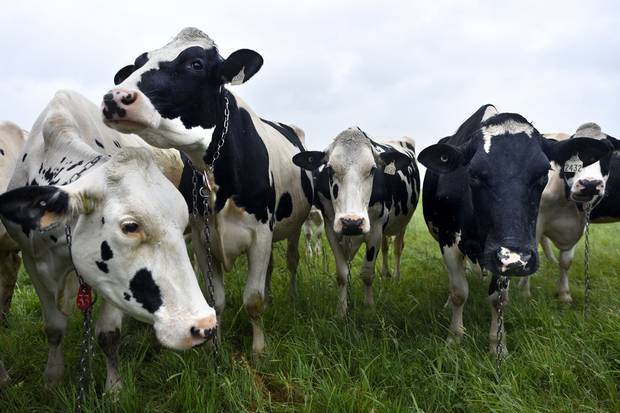
Cows graze in a field at Ferme Fleuralic Ltd. in Nicolet, Que. Justin’s father remembers having his first poutine after a day at the stock-car races in the area.
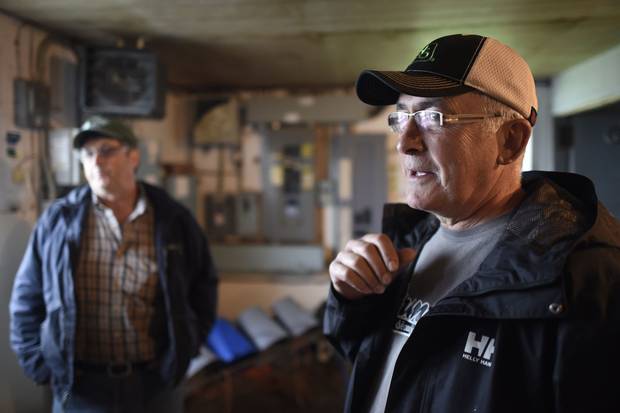
Louis Fleurent and Alain Hébert, president of Fromagerie Ancêtre, talk about organic dairy cows and cheese products during a visit to Ferme Fleuralic Ltd.
"It was 1964 and I had my first poutine after the races were finished," my dad is telling me on a sunny June morning as we stand surveying a small field near the town of Nicolet, just across the St. Lawrence River from Trois-Rivières. This overgrown patch of dirt was once a racing track where les gars de la terre battue – stock-car racers – piloted their vehicles around a clay oval. The races were held every Sunday, my dad tells me, starting after St-Jean-Baptiste Day and continuing until the first snowfall. When no races were scheduled, locals sneaked onto the track to race their family cars. Most of the joyriding came after an evening of poutine, beers and ridiculous boasts.
My dad stands here with me in the Quebec countryside , his Quebec countryside, recounting fond memories of piloting a convertible Chevrolet Impala around the track after drinking most of a six pack. Every inch of the car, he recalls, with uncharacteristic intensity, was crammed with bodies – friends of his, and "girls" egging him on. They went fast, he tells me, and they didn't crash.
We had set out from Trois-Rivières in his beaten-up Ford first thing that morning, making our way over the towering Laviolette Bridge, and then south, toward the dairies and green fields of the Centre du Quebec – an agricultural region tucked into a triangle of sorts, whose three points are my home town, and the two cities of Drummondville to the southwest and Victoriaville to the southeast. It's an area so small, you could easily traverse it several times a day. It was here that my father's family had worked the land for centuries and where he'd had that first poutine more than 50 years ago.
Driving east over the bridge, I had spied a tourism information centre and we had soon found ourselves browsing its walls of flyers that touted the region's attractions: bed and breakfasts, vineyards, cycling.
"Has anyone come by asking about poutine's history?" I asked Clement Prince, the well-appointed man in his mid-60s staffing the information desk.
"Never," he told me. "You're the first."
My father suddenly pushed past me, loudly announcing that I was his son and a reporter, and that we were looking to track down the history of poutine. Feeling a not-unfamiliar tinge of embarrassment at his bluster, I began to frame our goodbyes to Mr. Prince.
But my dad's fervour seemed only to pique the interest of the trim and tidy Mr. Prince. He was himself, he told us, a native of Princeville, a hamlet just a stone's throw away from Victoriaville, where a local diner, he continued, claimed to be the birthplace of poutine – although similarly distinct assertions of provenance, he added, were about as common in these parts as poutine itself: "Every small roadside fry shack around here claims they were first."
As we had driven away from the tourist office, Francophone music spilling from the radio, my dad told me he certainly wasn't buying any talk of poutine being born around Victoriaville. The dish, he seemed convinced, had originally come from somewhere around Drummondville , a full 45 minutes from there. Even the fry guy at my father's beloved long-ago race track had only extended poutine's reach, my father reiterated, not invented the dish itself. "The chip wagon that was here had been selling hot dogs and hamburgers at the races and decided to start offering poutine," he told me as we rolled past the race track. "People just threw themselves at it."
And from there, it was only a bridge ride away to Trois-Rivières, where poutine, he was convinced, got its big-city toehold.
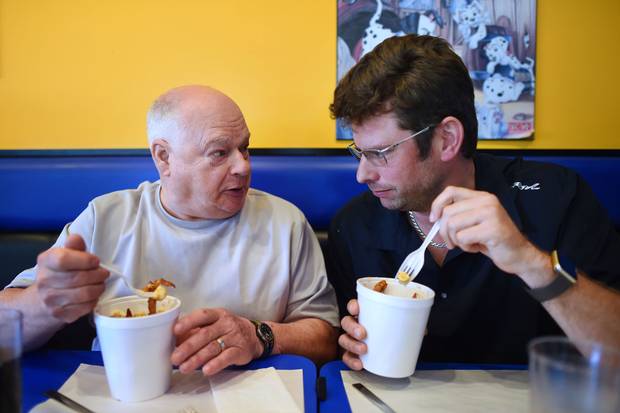
Justin’s father digs into his poutine with Dany Descôteaux, owner of Patachou restaurant in Trois-Rivières, Que.
And so – what the heck, this was a road trip with no official itinerary – we decide to retrace our steps and head back over that bridge, to a Trois-Rivières restaurant called Patachou, run by Dany Descôteaux, whose family had once lived and worked churning butter and making cheese.
Before long, he is patting my father's bulging stomach. "There's a lot of poutine in there," jokes the aproned Mr. Descôteaux.
And then he tells us what he knows about his family's role in the history of poutine.
Along with their fromagerie, the Descôteaux family had also operated a small fry wagon back in the day – beside the race track's own poutine-producing fry shack – and Dany's father quickly decided the new dish appearing next door was worth a look. The Descôteaux family made the dish popular in this city, he contends, setting it on the path to conquering Quebec (some would say the world). "Poutine's a family story. It goes to my dad, my granddad, my aunts and uncles, they've been selling it since 1971," he tells us. "It's been around me nearly my whole life, but I've shown some self-restraint because I never got too fat."
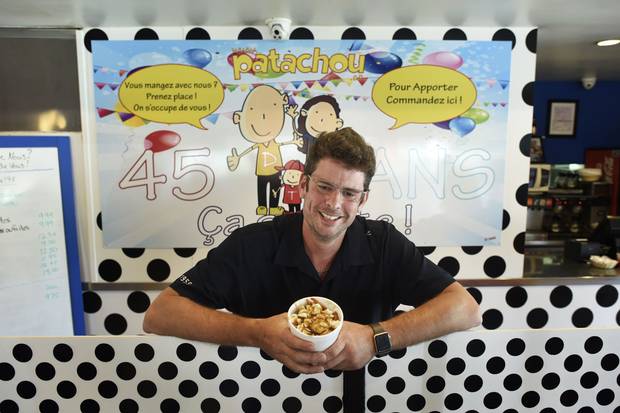
Poutine is a family tradition for Dany Descôteaux.
While some have characterized it as a rural recipe invented for farmers and lumberjacks, Mr. Descôteaux stresses that it is the epitome of modern cooking: easy to throw together, tasty and cheap. Sitting on vinyl chairs in the diner, whose walls are bedecked with cartoons and posters of comic-book heroes, we chat over coffee. Speaking the colloquial joual of these parts, we pivot from talk of where poutine first appeared, and begin to debate a less factious, if equally mysterious, element of the dish's creation story: its name.
Some have argued that the word comes from one of the first cooks who made the dish: He was apparently nicknamed "Ti-Pout"– short guy – which somehow got flipped into "poutine," possibly influenced by the English word "pudding." I throw in a story I've heard, that "poutine" once meant "mess" in Québécois slang. There are other theories, too – poutine's etymology being, it seems, almost as bottomless as its origin story.
Soon my dad and I are thinking the same thought: Enough talk – we are two full hours into our a road trip and haven't yet laid eyes on a plate of the stuff. Although it's not quite lunch, a few orders for take-out poutine have already started coming in, Mr. Descôteaux tells us. And so he invites us into his kitchen to see him at work.
He walks up to his deep fryer and pulls out a full, sizzling basket. "You start with the fries," he shouts – cut from fresh, local potatoes. Once frozen, he insists, a potato just doesn't taste the same.
Then, he says, you add the cheese. He picks up a spoonful of curds that had formed in a nearby fromagerie only hours earlier. Curds are a staple in Quebec, ubiquitous at farmers markets, and crowding gas-station counters. Moist to the touch, the fresh ones squeak between your teeth – and don't melt when they're drowned in gravy – a thick vat of which is waiting nearby. My dad is standing back and peering over Mr. Descôteaux's shoulder as the man grabs a ladle and stirs. Patachou's poutine gravy is made from a recipe, he says, that was handed down from his grandfather.
We head back to a booth with a Styrofoam bowl full of poutine. It is excellent , my father and I agree. The fries are crisp. The sauce is a bit spicy, but doesn't cover up the taste of the cheese, which squeaks with each bite.
We thank him for the food and clamber back into the car. Heading east, we look for the fromagerie that was once owned by Mr. Descôteaux's family. Several dead ends and U-turns later, we find it – or rather, where it used to be. This station on our poutine pilgrimage – the place behind the dish's soaring popularity – is now a wrecking yard, home to junked cars and tall weeds.
"It used to be here," my father says, after we drive around for several minutes, though his voice is unsure. This is no longer the south shore of his youth.
I grew up just a few minutes from here, and I'd driven past this area hundreds of times growing up, but I'd never looked twice at this stretch of road , let alone thought what it might mean to my dad. As we head east on Highway 55, my father, to my utter surprise, pops in an Adele CD.
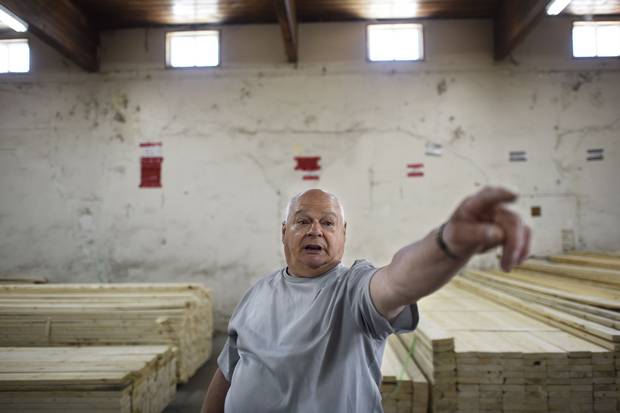
In Saint-Leonard-d’Aston, Que., Justin’s father revisits the old building that once housed the cheese factory where he worked. It’s now a lumber and home building supply centre.
About an hour later my dad's eyes are widening as we walk into a room he has not entered decades.
We are in what was once a small fromagerie in the village of St-Léonard-d'Aston, about a 15-minute drive from the farmhouse where my dad grew up. In this building, I was about to learn, important chapters in poutine's story – and in my father's – once intermingled.
The low, brown-brick structure is now a storage shed for a hardware store, whose harried manager has acceded to our request for a self-guided tour. Packed with lumber, it has a ceiling that sports massive wooden beams and dark joists. My father points to a spot where once stood doors to the room where the cheese was made; the former doorway is now filled in with cheap concrete blocks. What was once the milk laboratory is full of rubbish. An area that today still holds fixtures from the 1950s, and where my father and his co-workers once changed into their work clothes, is stuffed with rolled mats of pink insulation.
Although this relic of my father's past is now almost lost to time, as we tour it I notice a bounce in his step I have never seen before. Pointing out small marks on the walls, and other oddities that speak to a long-ago time of milk-processing and curd-making, my dad – who in a few months' time is set to undergo a knee replacement – is gliding across the floor with excitement.

And then, when we climb back into the car and hit the road again, a bigger story starts tumbling out.
In the early 1960s, when the fromagerie was humming with activity, my teenage father would take a 40-pound block of curdled milk, send it through a large cutting machine that looked like a push lawnmower, and sprinkle just the right amount of salt on the finished product: cheese curds. He worked there for two years before taking over a milk run from his own dad in 1964, and working it for another four years.
As we drive past green fields of corn, wheat and barley, we are also driving back in time.
He would start his run each morning, my father continues, at his own father's house – his first client of the day – and load eight-gallon milk jugs into a truck bound for the fromagerie. "In those days, there were lots of small farmers who had 10, maybe a dozen cows," he tells me. As I listen, I pick out many of the barns and silos once owned by those families – buildings still standing against the bright summer sky. "They kept what they needed and sold the rest to the local fromagerie," my dad continues. "The problem is that these guys didn't own fridges, so the quality suffered" as jugs baked in the sun for hours, waiting for him to collect them.
Eventually, fromageries began requiring farmers to own refrigerated tanks to store their milk. Practically overnight, my dad, a proud working man, became obsolete. But almost as quickly, a big milk company offered to buy him a state-of-the-art tanker truck, and even offered generous repayment terms, he told me. Panicking over the thought of such debt, he turned them down.
I breathe deeply as he speaks, listening to a story I'd never heard before, but that seems to distill in a single tale all that I had long judged to be the parochialism of my father – the fear of the unknown, the determination not to move up and out and grab the world by the tail.
"I should have done it," he admits glumly. But, he offers, life was different then, and his world was one founded on putting one's nose to the grindstone: of thinking of your next meal, not the big picture. "I'd been working nearly seven days a week since I was born. I milked cows seven days a week, I ran the milk run seven days a week, I worked at the fromagerie seven days a week. So, when they offered me a job where I'd be $70,000 in debt, I panicked."
We are nursing two cups of coffee and he takes a very long sip.
He didn't know the world was changing, he says. A neighbour accepted the deal and took over the run instead. "A year after that," he says, "he sold his milk run for about $3.2-million in today's money. All I had to do was take the money and take a two-week class. I didn't take it. I became a welder instead."
And eventually married my mother. And raised my sister and me.
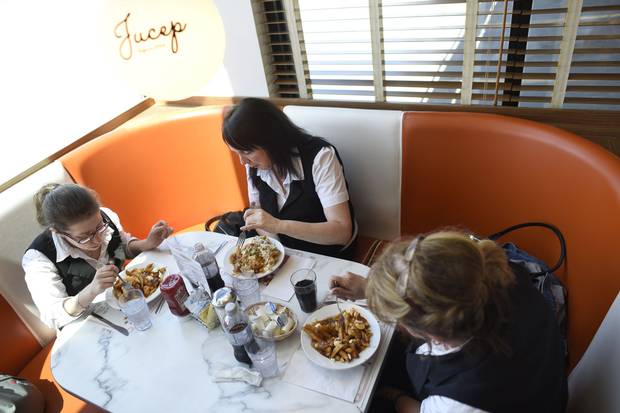
Annie Brouillard, Monique Doiron and Violette Beaudoin have poutine for lunch at the Roy Jucep in Drummondville, Que.
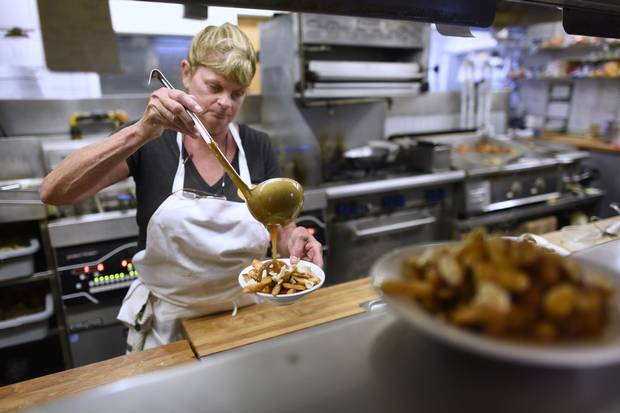
Suzanne Lussier prepares poutine at the Roy Jucep.
"We're a poutine factory," says manager Renée Brousseau, as plates of the stuff are carried away behind her. We've driven a little ways southwest, to Drummondville, and are at a resto called the Roy Jucep, easy to spot from the road thanks to a big plastic orange slice perched on its roof (the place is also known for its juice). Cars park outside where, in my father's day, carhops once rushed back-and-forth delivering orders.
Many in Quebec, my father included, believe this may be where poutine was first invented, by Jean-Paul Roy, in the mid-1950s. Even Ottawa has given the nod to that notion: Hanging near the door is a certificate from the federal government stating that the establishment holds the trademark for "poutine's inventor."
But as with many things in which the feds like to fiddle, no sooner does Ms. Brousseau point it out to us than a client, waiting in a booth for his order of poutine , loudly challenges the claim. When a waitress points to the certificate, he reads it and whistles, presumably chastened.
"That happens a lot," she tells me, after he leaves.
Apparently knowing a lost cause when it sees one , the provincial government won't intervene, says Ms. Brousseau. When I mention that most online searches about poutine's past lead to restaurants in Montreal, she shudders. Montreal's poutine has a poor reputation here in the dish's heartland.
As does most poutine that comes from anywhere other than where a given poutine fan lives. "The first thing we do when we get home from vacation is go out and eat a poutine," says customer Violette Beaudoin. "It's a taste of home. They don't make it the same anywhere else."
We pass on a helping of poutine, still full from our early lunch.
Back in the car, we drive east, along Highway 20, till we get to a small diner in the hamlet of Princeville. The Restaurant Princesse doesn't look impressive from the outside, but people have recommended it as a spot that makes a poutine using a decades-old recipe.
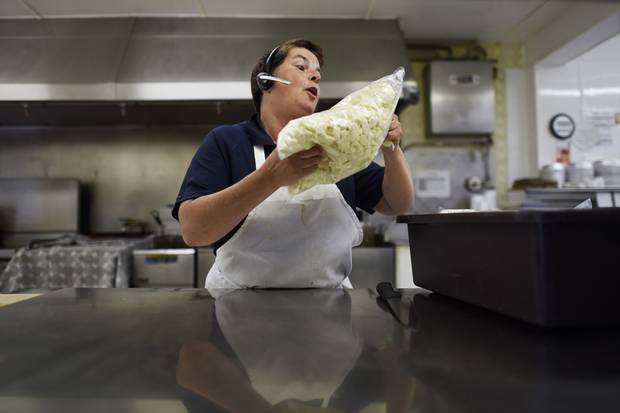
Nathalie Bergeron uses a chef’s knife to break up large bags of cheese curds at the Restaurant Princesse in Princeville, Que.
It's a family-run joint where the fries are crinkle-cut – an unusual choice that makes me wonder if we've erred in our lunch selection, and a sweeter gravy than any I've had before. The curds, however, are sublime: Their fromagerie is right nearby, and they're incredibly squeaky. The diner invites customers to mix up the ingredients on their plate: They're delivered in little discreet piles, so you can get your proportion of fries, sauce and curds just right.
We settle our bill, about $9 per poutine, and head out. And although we are nothing if not full, when we come upon the town of Warwick, about a half-hour to the south, having passed farmers' fields and the occasional ski slope, we somehow manage to find ourselves at yet another purveyor of poutine: Neither of us has ever been here before, and so we stop into a roadside restaurant called the Cantine W, for no other reason than to get our bearings and ask for directions (I swear).
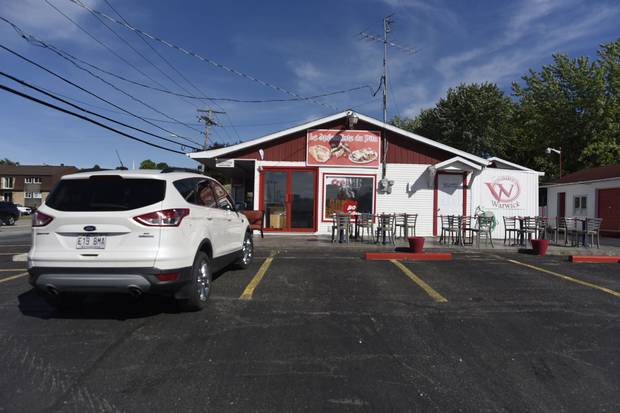
The Cantine W restaurant in Warwick, Que.
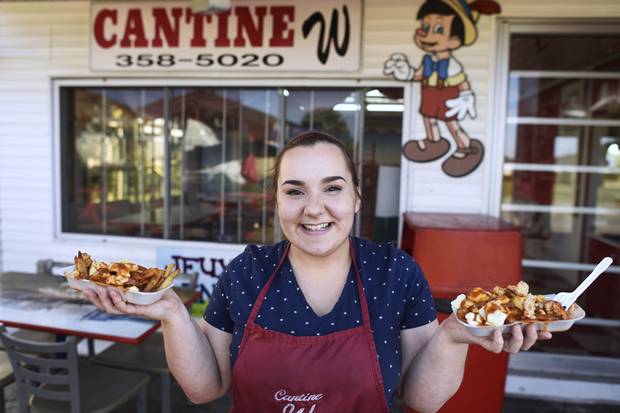
Virginie Gadbois, owner of the Cantine W, holds dishes of poutine outside her restaurant.
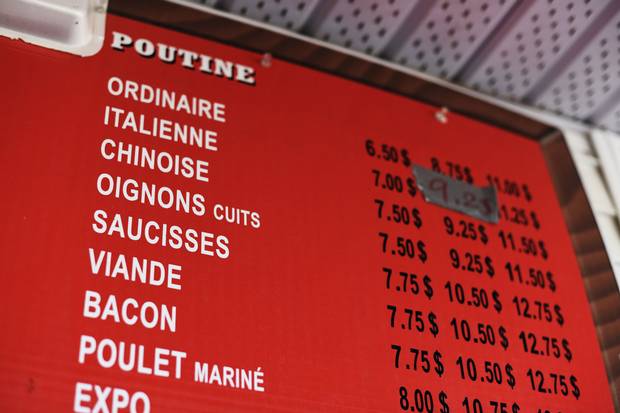
The menu at Cantine W.
But then we see the Cantine W's poutine. Clearly unconcerned with the roots of poutine, it serves a range of poutinesque combos that eschew any notion of tradition. The bestseller this summer, we're told, has chicken-wing sauce and pita meat. The afternoon heat is starting to bear down on us, and in the distance we hear cicadas whirring to life. Our eyes meet and neither of us two Québécois stalwarts are going to have any of this. But the Cantine W's oddball offerings, and an owner who won't take no for an answer, have us soon waiting for another helping. (Seeing enormous, heart-stopping servings exit the kitchen, we do, at least, have the sense to ask for a sample serving, to share.)
It appears several minutes later and is the size of a football. "We take poutine seriously," the young owner says with a smile. Sitting ourselves down on an outdoor swing, we get to work. The chicken-wing sauce is orange, glistening on the curds. The pita meat is thick and mixed in with the greasy fries. After two or three bites, we're stuffed. But happy.
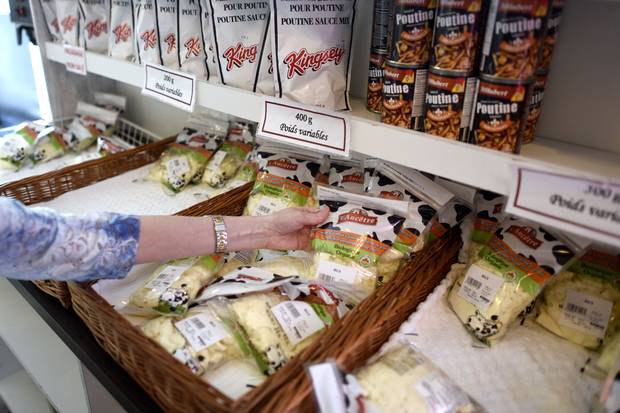
A customer reaches for a bag of fresh cheese curds at the Fromagerie L’Ancerie near Saint Grégoire, Que.
Quebeckers may never agree on who makes the best poutine, or who made it first, but they'll agree on the importance of cheese curds. And as my dad and I, sated and quiet now, drive back toward Trois-Rivières through a landscape criss-crossed with pastures on which dairy cattle graze, he suggests I make one last stop – not far from where we started that morning.
My father gives me the name of an an old neighbour of his; I find his number and call ahead. He is Alain Hébert, and for seven years now he has run the Fromagerie l'Ancêtre. Surrounded by bags of curds in his small front shop, he talks about how modernity has made it harder to keep making curds. The once-local fromageries across Quebec have now been snapped up by global companies, he says. They're uninterested in producing curds, which have to be made fresh daily and don't command much of a payout.
He begins talking about the finer points of how the world used to be. But the details, somehow, don't seem all that important. I settle into a chair, put down my pen, and take a deep breath. For one of the first times in ages, I let my self relax and listen to the joual banter.
It feels good to be home.
CULINARY ODYSSEYS: MORE FROM THE GLOBE AND MAIL
